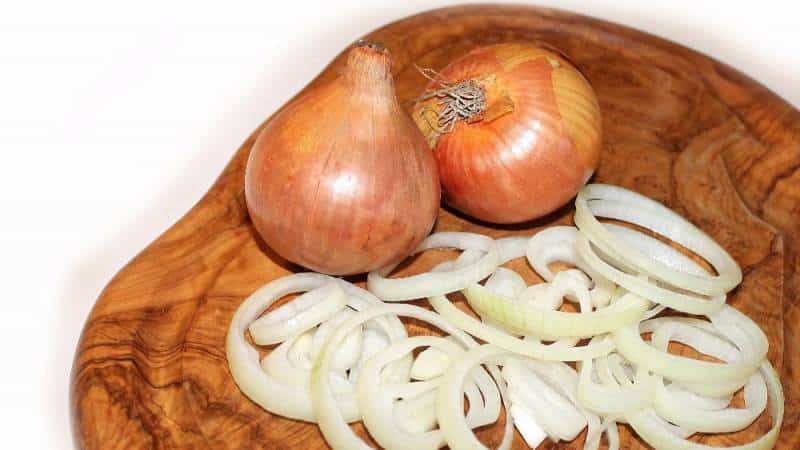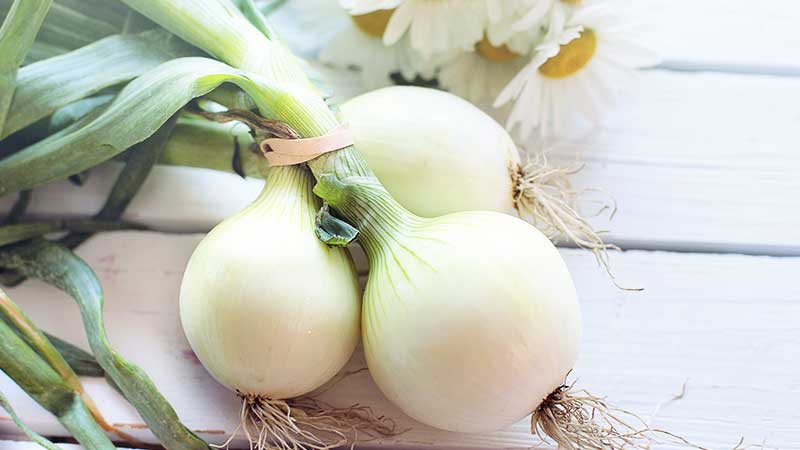What happens if you eat onions every day?
In Russia, onions have been used since the Middle Ages to add a fresh smell to meat dishes. It was mainly consumed by peasants, boyars - in limited quantities, only with caviar or liver. Even then, onions were used as an antimicrobial product.
However, the healing properties of this product are not limited to antimicrobial effects. Peasants, without realizing it, supported the health of entire generations by preventing infertility, digestive problems and nervous disorders.
But is it healthy to eat? onions every day? We will tell you further about the norms for using this product, whether you can eat a lot of raw onions and what will happen if you eat onions every day.
Useful properties of onions
Onions are an indispensable crop for the human body due to their healing and antibacterial properties. The high content of vitamins B, PP, C supports metabolic processes. Calcium and vitamin K strengthen the bone frame. Iron, phosphorus and zinc stimulate immune processes.
The content of phytoncides, glycosides (saponins) and flavonoids allows us to classify this vegetable as a natural “medicine”. Iodine, pectins, organic acids (malic, citric) and essential oils support vital processes in the body associated with the removal of toxins and waste.
 With regular consumption of onions, the reproductive system of women and men is adjusted to function properly. The vegetable is prescribed as an addition to the main treatment for infertility.This does not solve the problem itself, but contributes to general therapy.
With regular consumption of onions, the reproductive system of women and men is adjusted to function properly. The vegetable is prescribed as an addition to the main treatment for infertility.This does not solve the problem itself, but contributes to general therapy.
Interesting. Onions have been known since ancient times as the “musk of the poor” (Egypt). It increases sexual desire. However, hypertensive patients should use it with caution - the product causes arrhythmia and increases blood pressure.
With daily consumption of this useful product, a person stores up substances that have a beneficial effect on all systems of the body. Moreover, the bulbs are equally useful for women and men. In old age, onions will help preserve the mind and memory, and in adulthood - beauty and immunity.
The high content of vitamin C, amino acids and flavonoids supports the body and protects against colds and infectious diseases. With daily consumption of at least half of the “onion head”, a person reduces the risk of acute respiratory infections to a minimum.
What are onions good for? women:
- promotes skin rejuvenation (stimulates collagen production);
- fights excess weight (burns cholesterol and carbohydrates);
- helps in the treatment of dermatitis, bleeding gums;
- stimulates hair growth, fights age spots and freckles;
- prevents baldness;
- prevents the development of cancerous tumors (quercetin in red varieties);
- has a positive effect on the cardiovascular system, especially after childbirth;
- treats “stars” on the legs and mild forms of varicose veins;
- supports hormonal levels, the reproductive system, neutralizes menstrual syndrome;
- prevents the development of breast cancer;
- normalizes digestion.
The effect of the vegetable on the male body is also beneficial:
- prevents prostate cancer, treats prostate diseases, relieves pain when urinating;
- acts as an aphrodisiac, increasing libido, potency and improving sperm quality;
- reduces the risk of thrombosis, increases blood pressure (useful for hypotensive patients), stimulates hematopoiesis;
- heals tissue with sprains, wounds, burns, frostbite, ulcers;
- reduces blood sugar levels;
- useful for a sedentary lifestyle, atherosclerosis;
- cleanses the liver and kidneys and is used in their treatment;
- promotes healthy sleep;
- strengthens bone tissue, teeth, cornea, blood vessels and joints;
- prevents the occurrence of heart attack and gout.
For children, onions are used as:
- antiviral and anthelmintic agent;
- natural product against dysentery, diphtheria, tuberculosis;
- medicines for flu, sore throat, pneumonia, cough, phlegm;
- means to increase appetite, relaxant for overexertion;
- a product that prevents the development of caries;
- anti-cold remedy.

The product is also used in the treatment of iron deficiency anemia.
Attention! If a child has asthma, attacks of suffocation may occur due to the content of prostantil, saturated with sulfur. There is also a risk of an individual allergic reaction.
Norms for the use of onions
The question of how much onion you can eat per day is individual. For a healthy person, 150-200 g of the product in any form will not cause harm, especially if the portion is eaten gradually throughout the day. In addition, not everyone sees the need for such a quantity. At best, a person eats 75 g of product daily (1 onion).
Raw vegetables are rich in macro- and microelements, as well as vitamins, which are quickly absorbed due to the composition of nutrients. The average consumption rate is 100 g.For a child’s body, starting from 3 years old, 30-50 g will be enough, followed by an increase in portion.
A vegetable baked in foil is not inferior in its properties to the raw product. Some vitamins are lost, but not as much as during cooking or stewing. You can eat 3-4 baked onions a day.
Boiled is inferior to raw and noted in terms of vitamin content, but the chemical composition still remains rich. Due to the destruction as a result of heat treatment of substances that irritate the gastric mucosa, you can eat 100 g more boiled onions. On average, the consumption rate is 150-200 g. The same rule applies to stewed onions, which will be an excellent addition to a portion of beef liver.
Fried onion filling, and its consumption is undesirable if you have digestive problems. The consumption rate for a healthy person is no more than 100 g.
Pickled (rings) are consumed only in freshly prepared form. The norm is no more than one onion (50-75 g).
The fresh product benefits healthy people, while the baked product replenishes the lack of substances in case of problems with digestion, liver or heart. Other forms blanks less preferable.
Can onions harm the body?
Onions can cause serious harm only in case of individual intolerance, as well as when regularly used with oils and vinegar.
This product also has a number of contraindications that indicate potential negative consequences.
Asthmatics should use the vegetable with caution. Its pungent smell, penetrating to tears, causes asthmatic attacks.Onions are contraindicated in the acute period of gastritis, gastric and intestinal ulcers, and other digestive problems.
After a large feast with pickled preparations or another case of overeating, the question may arise, what will happen if you eat too many onions? Exceeding the norm of consumption of the product is an infrequent occurrence, due to the satiety of onions and its specific taste. However, such situations still happen. Most often, onion lovers suffer from bloating and heaviness of the stomach, sometimes they are overcome by heartburn or flatulence. In this case, it is recommended to switch to a gentle diet with a predominance of fermented milk products.
The effect of onions on the body

Onions are especially useful for a growing body. The vitamins and minerals contained in one bulb support hematopoietic processes, which is important in the development of the circulatory system. European cuisine traditionally uses onions as a main ingredient in soups, and fried and pickled onion rings are also popular.
In Russian cuisine, onions are often chopped and steamed, losing their original value. It is advisable to give children a fresh product without bitterness and odor (sweet or salad varieties).
Onions are also useful in old age - they replenish calcium and magnesium deficiency. Reduces the risk of fractures and sprains, stabilizes blood pressure, and improves sleep quality. The product is used as a remedy (decoctions) for insomnia, which is considered a frequent companion of old age.
Onions have a beneficial effect on the immune and excretory systems. Due to its rich vitamin and mineral composition, the vegetable helps cleanse the body of toxins and waste, maintains the condition of the liver, and makes blood vessels more elastic.The diuretic effect of onions occurs without side effects, which is why the product is often used as a decongestant.
With a balanced diet and no problems with the gastrointestinal tract, daily consumption of onions does not harm your health. However, with age, the condition of the digestive organs and individual enzyme glands make onions more dangerous for consumption. In this case, daily norms are calculated by the attending physician.
Who should limit onion consumption?
There are a number of restrictions on this vegetable.
Main contraindications for eating it:
- chronic gastrointestinal disorders (ulcers, exacerbation gastritis, diseases pancreas, chronic flatulence, high acidity of gastric juice);
- high blood pressure (hypertension);
- strokes and heart attacks;
- acute course of kidney and liver diseases;
- pregnancy in the last trimester (allergic reaction of the fetus);
- asthma;
- allergy to onions.
For diabetics, the optimal amount of onions per day (as well as other products) is determined by the attending physician.
In other cases, the bulbs can be eaten regularly. This will not only reduce the risk of heart attack or stroke in old age, but also maintain healthy skin, hair and nails in youth.
Why might you crave onions all the time?

If a person notices that he craves a certain product for a long time, this does not mean that his body is experiencing a deficiency of nutrients. Throughout life, a person often changes taste preferences.
However, if you have an excessive craving for onions, you should get tested (blood, hormones). Perhaps the body really requires the microelements it needs to function properly.The most common cause is a lack of vitamin C, iodine, potassium or iron.
Taste preferences in food are analyzed in the presence of malfunctions in the body.
The desire to eat onions constantly can be caused by the following factors:
- vitamin deficiency and weakened immunity - lack of vitamin C, iodine, iron;
- hormonal imbalance and central nervous system disorder - lack of vitamins B, PP, K;
- violation of metabolic processes and metabolism - lack of selenium, phosphorus, vitamins A, E;
- muscle dysfunction, cramps, spasms, aches - lack of potassium, magnesium and calcium;
- the liver is working at its limit - the need for cleansing of toxins;
- disruptions in the functioning of the cardiac system and digestion - excess cholesterol, obesity.
In some cases, one is drawn to onions when diseases of an infectious or fungal nature begin. In this way, the body tries to weaken the effect of the foreign agent.
Conclusion
The medicinal properties of onions make this vegetable almost obligatory for consumption. Just half an onion a day can create a powerful barrier to a wide variety of diseases.
However, bitter essential oils of onion negatively affect digestion and respiratory channels. When eating it, you should limit yourself to 50-200 g of the prepared product, depending on the existing contraindications and the diet as a whole.